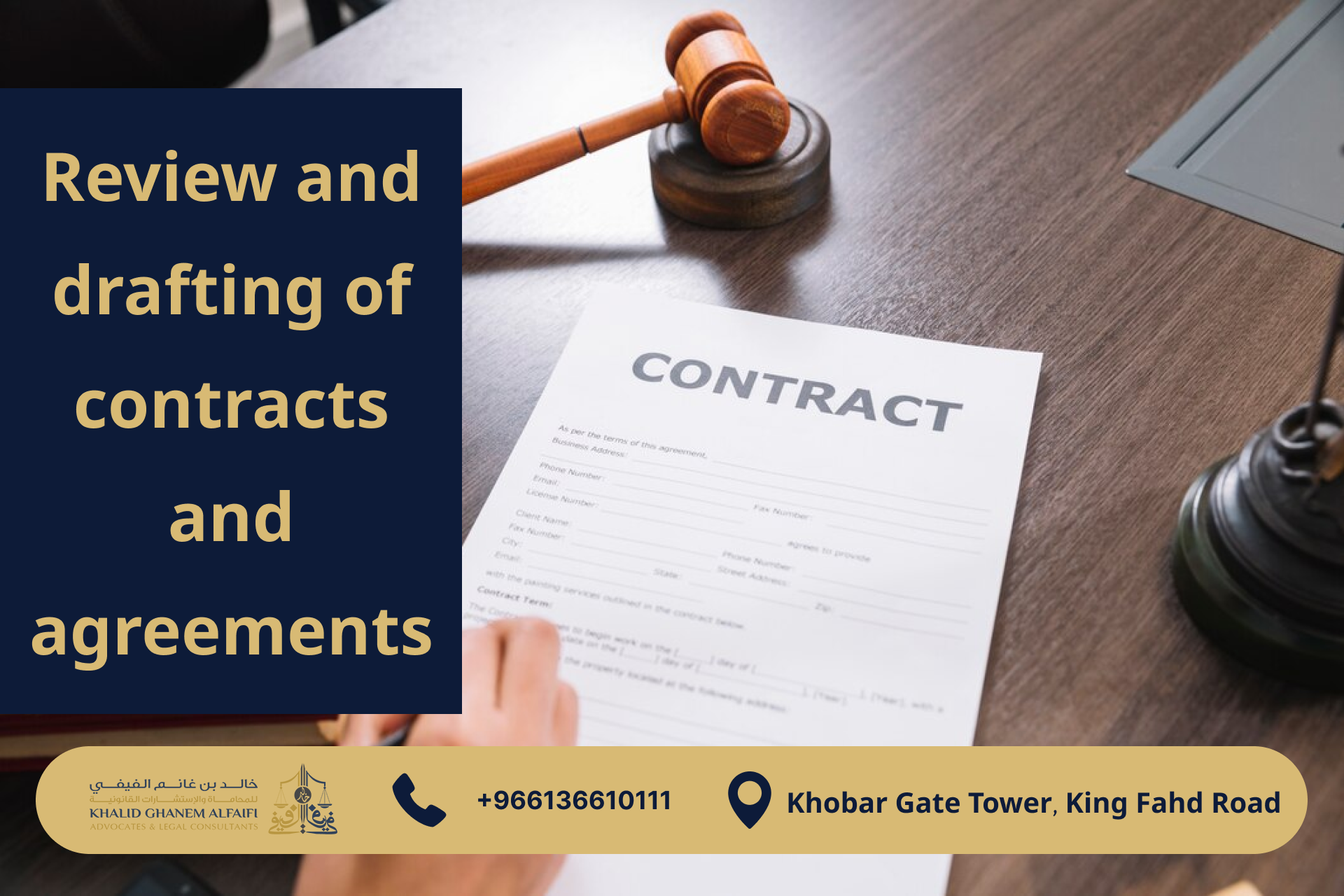The Role of drafting and reviewing contracts and agreements
Drafting and reviewing contracts and agreements play a vital role in regulating relationships between individuals and companies. They clearly define the rights and obligations of contracting parties and outline the agreed-upon terms in a legally organized manner. Whether you’re planning to enter into an employment contract, a partnership agreement, or a memorandum of understanding (MoU), consulting an expert in contract drafting is essential to protect your interests and prevent future disputes.
Importance of drafting and reviewing contracts
The first step toward preparing a sound legal contract is reviewing it before signing. This review allows the parties to ensure that the terms comply with the applicable laws and regulations and that there are no mistakes or exploitable loopholes. Reviewing contracts provides an opportunity to clearly define commitments and responsibilities, preventing any future misunderstandings between the parties.
Benefits of Contract Review
1.Protecting Parties’ Rights: A well-drafted contract helps ensure that all parties’ rights are protected and that each party's obligations are clearly specified.
2.Reducing Legal Risks: Properly prepared and thoroughly reviewed contracts reduce the likelihood of exploiting legal loopholes or ambiguous terms. This includes:
Clarifying Responsibilities: Eliminates ambiguity regarding each party’s responsibilities, minimizing the risk of disputes.
Compliance with Local Legislation: Ensures all terms align with current laws and regulations, safeguarding the parties from legal liabilities.
Anticipating Potential Issues: Provides a framework for addressing potential problems or disputes before they arise, facilitating swift and effective resolutions.
3.Reducing Disputes: Well-prepared and reviewed contracts minimize the chances of legal disputes.
4.Clarifying Obligations: Contracts help clearly outline the financial and operational responsibilities of each party.
Role of Memoranda of Understanding (MoUs) in Business Relations
MoUs are an effective tool for facilitating commercial and legal relationships between various parties. They serve as an initial step to document the parties’ shared intentions, without the legal obligation typical of formal contracts. MoUs help set the foundation and principles for the future relationship between the parties.
When to Use Memoranda of Understanding
Seeking New Partnerships: Used to clarify common goals and mutual understanding between companies aiming to establish new partnerships.
Extended Negotiations: Useful during lengthy negotiations, providing an initial framework for goals and conditions.
International Relations: Frequently used in international matters to document intentions between governments or multinational companies.
Types of Contracts and Agreements
Contracts and agreements can vary based on the nature of the relationship between the contracting parties. Common types include:
1.Employment Contracts: Agreements that specify employment terms, including the rights and obligations of both parties.
2.Partnership Agreements: Regulate the relationship between partners, specifying each partner’s share and rights in the business.
3.Commercial Contracts: Used between companies to govern business transactions and financial agreements.
4.Sales and Purchase Agreements: Used to manage the sale or purchase of products or services.
5.Construction Contracts: Govern the relationship between the project owner and the contractor responsible for carrying out construction or engineering work. These contracts specify the scope of work, project timeline, cost, and required technical specifications.
6.Government Contracts: Entered into between the government and companies or individuals to execute specific projects or provide services or products. These contracts typically follow precise procedures and conditions to ensure transparency and adherence to local laws.
Essential Contract Clauses
Drafting contracts and agreements involves including essential clauses to ensure clarity and ease of legal enforcement. These include:
Contracting Parties: The parties involved must be clearly identified, with all necessary legal details provided.
Subject Matter: The contract's subject must be defined precisely to ensure the parties understand the agreement's content.
Terms and Conditions: Include all the terms governing the relationship between the contracting parties.
Contract Duration: Specify the contract period, including start and end dates.
Obligations and Responsibilities: Clearly outline each party’s duties and obligations.
Dispute Resolution Mechanism: The contract should include a method for resolving any disputes that may arise between the parties.
Penalties and Breaches: Define the penalties to be imposed in case either party fails to fulfill agreed-upon terms.
Termination Clauses: Outline the conditions under which the contract may be terminated by any party, whether due to a breach or other reasons.
The Best Office for Contract Review and Drafting in Saudi Arabia
If you are looking for the best office to handle contract and agreement review and drafting in Saudi Arabia, our team at Khalid Bin Ghanem Al-Fifi Law Firm is the ideal choice for high-quality, efficient legal services. The firm features a team of specialized attorneys in contract drafting and agreements, ensuring that you receive meticulously crafted legal contracts that fully protect your rights.
Why Choose Khalid Al-Fifi Law Firm?
Extensive Expertise: The firm includes a team of attorneys specialized in various fields of law, allowing them to provide comprehensive legal solutions.
Professionalism and Precision: The firm offers contract drafting services in a professional manner that takes into account all precise legal details.
Legal Consultation: The firm provides specialized legal consultations to assist you in making the right decisions regarding your contracts and agreements.
Read also: Division and settlement of estates





